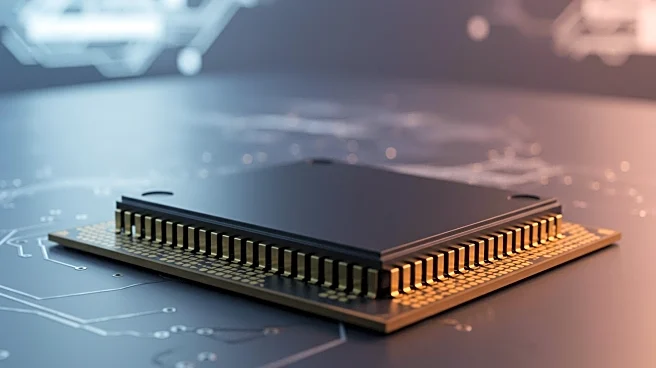What's Happening?
President Trump has reversed his previous call for Intel CEO Lip-Bu Tan's resignation, now praising Tan's 'success and rise' as an 'amazing story.' This change follows a meeting between Trump and Tan, where they discussed Intel's commitment to strengthening U.S. technology and manufacturing leadership. Trump expressed interest in collaborating with Intel, highlighting the importance of the company's role in the U.S. tech industry. Previously, Trump had criticized Tan for alleged ties to China, but the recent meeting appears to have shifted his perspective.
Why It's Important?
The reversal in Trump's stance on Intel CEO Lip-Bu Tan underscores the strategic importance of Intel in the U.S. technology sector. As a major player in semiconductor manufacturing, Intel's leadership and collaboration with the government could influence national tech policies and initiatives. Trump's willingness to work with Tan reflects the administration's focus on bolstering domestic technology capabilities and addressing potential challenges in the industry. This development may impact Intel's future operations and its role in advancing U.S. tech leadership.
What's Next?
Following the meeting, Trump and his Cabinet members are expected to collaborate with Intel to explore solutions for strengthening U.S. technology and manufacturing. This partnership could lead to initiatives aimed at enhancing Intel's production capabilities and addressing any concerns related to international ties. The administration's focus on Intel may also influence broader tech policies, potentially impacting other companies in the industry. Stakeholders will likely monitor the outcomes of this collaboration and its implications for U.S. tech leadership.
Beyond the Headlines
The shift in Trump's stance on Intel CEO Lip-Bu Tan highlights the complex dynamics between government and major tech companies. As Intel navigates its role in the U.S. tech sector, the company's leadership and strategic decisions could have long-term implications for national tech policies and industry standards. The focus on collaboration and strengthening domestic capabilities reflects broader trends in tech policy, emphasizing the importance of maintaining U.S. leadership in the global technology landscape.









